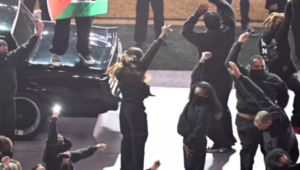During the 2025 Super Bowl halftime performance by Kendrick Lamar, an incident involving a dancer caused significant controversy, leading to the individual being banned for life from attending any NFL events. The dancer, while participating in the performance, unfurled a flag that combined Sudanese and Palestinian symbols, which also included the words “Sudan” and “Gaza.” This act appeared to be a political protest in solidarity with the ongoing conflicts in those regions, making a bold statement during the high-profile halftime show.
The event took place during the final track of Lamar’s performance, “TV Off,” when the dancer was atop a car prop used in the show. The protest was entirely unauthorized and took everyone involved, including Lamar and his team, by surprise. Security quickly intervened, and the individual was detained. The NFL released a statement clarifying that neither Lamar nor the production team had any knowledge of the dancer’s actions. The protest was not part of the planned performance, and it was not coordinated with the NFL or Roc Nation, which is responsible for producing the halftime show.
In response to the protest, the NFL stated that the dancer’s actions were not tolerated, emphasizing that the NFL holds all its events to a high standard of professionalism and does not allow for unauthorized political statements during its broadcasts. As a result, the individual was banned for life from attending any future NFL games or events.
The incident occurred at a time when the political landscape surrounding Gaza and Sudan was highly tense, with global attention focused on the ongoing conflicts in those regions. The Palestinian flag, combined with the Sudanese symbols, was used to protest these situations, and the action was perceived as a political statement within a highly public space. The NFL, a commercial and entertainment entity, has a longstanding policy against allowing political protests during its events, particularly those as widely viewed as the Super Bowl.
The protest drew immediate attention, especially considering the Super Bowl’s massive global audience and the presence of high-profile figures like President Donald Trump at the event. Although the protest itself was unauthorized, it highlighted the difficult intersection of political expression and large-scale entertainment events. The incident ignited debates about whether such statements should be allowed during entertainment broadcasts, and it raised questions about the role of artists, performers, and fans in expressing political views within these platforms.
Despite the controversy surrounding the protest, the performance continued without interruption, and the protest was not broadcast on television. The dancer was removed from the stadium by security, and the NFL and local authorities, including the New Orleans Police Department, began investigating potential charges for the individual involved.
The incident sheds light on the complexities of balancing artistic expression with political statements, especially during major events like the Super Bowl. While the protest was not part of the official performance, it sparked discussions on freedom of expression and the limitations placed on individuals during highly public events.

